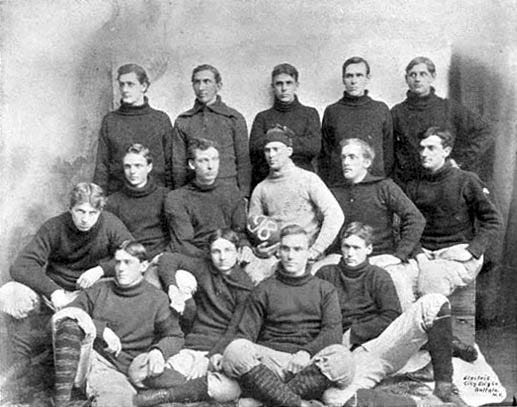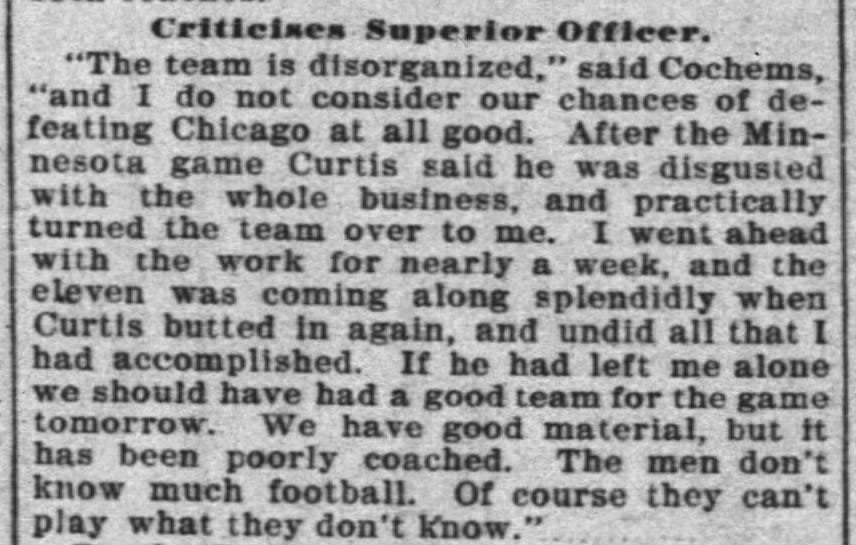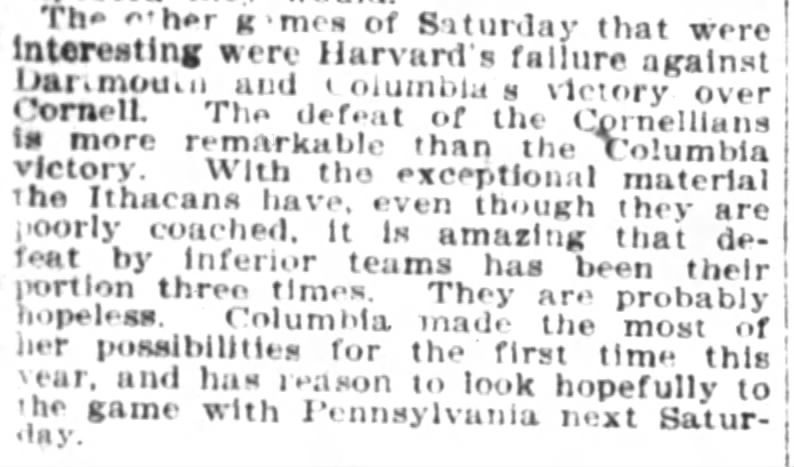Today's Tidbit... Poorly Coached Teams of Old
There isn't an insult that hits harder in football than to say a team is poorly coached. I don't know what defines a team as being poorly coached, but you know it when you see it. At least, that's what people who throw around the term seem to think.
Indeed, some teams are more organized, snappier, and give 110%, while others incur pre-snap penalties, fail to execute the "basic fundamentals," and mostly lose games or fail to live up to expectations.
Like everything else in football, there is a history of poorly coached teams that I thought would be worth exploring, so I searched for "poorly coached" and "football" between 1890 and 1909. I only received 67 hits, so teams were better coached back then, or people were more polite. I only made it through half of the 67 articles before deciding I had found enough material for a Tidbit.
Before digging into the article details, I asked one of our artificial intelligence overlords to describe the characteristics of poorly coached college football teams. It identified the following:
Unmotivated players
Overly negative coaches who are controlling, strict, or yell at players.
Uncoachable players
Players overthink their game due to constant criticism by the coach
Pressuring players to play when injured
Not listening to athlete feedback
Choosing favorites
Having poor communication with athletes
The earliest article mentioning a poorly coached football team concerned the 1894 Yale squad, coached by William Rhodes and captained by four-time All-American Frank Hinkey. What's lovely about the mention is that it came two weeks before the team's first game and suggested that if the talented team did not win the championship, it would be due to being poorly coached.
Yale finished 16-0 that year.
Two years later, a former Yale player coaching the University of Chicago started the season by winning twelve straight, including the first four against local high schools, but then went 2-2-1, losing to Wisconsin and splitting two games with Northwestern. The columnist noted that the Amos Alonzo Stagg-led Maroons were poorly coached in their first game with the Purple, though things changed three weeks later. Thankfully, the boys from Chicago defeated the Wolverines the next week to finish 15-2-1.
Two years later, the 8-3 Nebraska Cornhuskers ran through their lesser opponents, winning some and losing others when facing stiffer competition, including a 24-0 loss to the Kansas City Medics. As might be expected, some criticized Fielding Yost's team as being poorly coached.

The following year, John Heisman, then coaching Auburn, got into a back-and-forth public letter-writing spat with a game official Heisman had declared incompetent. Taylor, the official, accused the Auburn team of being poorly coached despite having beaten Georgia Tech 63-0, the Montgomery Athletic Club 40-0, and Clemson 34-0. Since Auburn subsequently tied Georgia 0-0 and lost to Sewanee 11-10, Mr. Taylor may have had a point, but probably not.

One of the more interesting episodes came when the 1904 Wisconsin team was accused of being poorly coached - by its assistant coach, Eddie Cochems. The 1904 team opened 4-0, blowing out Notre Dame and Marquette, but took one on the chin, 28-0, against Michigan. The head coach, Arthur Curtis, washed his hands of the team and turned it over to Cochems, only to return a week later. In the ongoing dispute, the Badgers beat Beloit and then lost to Minnesota and Chicago. Neither coach returned for the 1905 season. Cochems took over at Clemson for a year and then spent several at St. Louis. Curtis finished medical school and never coached again.
Some blamed Cornell's failings in 1905 on poor coaching. The Big Red lost to Columbia in the third of four straight losses to finish the season. Their coach, Pop Warner, never amounted to anything in the coaching profession.
Our final example of poor coaching came in 1908 when former Chicago All-American Walter Eckersall labeled Minnesota's team as poorly coached, especially for not keeping up with the new game. H. L. Williams, then in the 9th of his 21 years coaching Minnesota, did not have a great team that year, but there must have been something else going on between the former rivals. Still, in the post-1905 Purity Dinner era, the Minnesota and Chicago teams dined and attended a show together following the game, so the relationships between teams must not have been too bad.
To be clear, I did not intentionally search for articles accusing Hall of Fame coaches of having poorly coached teams. Those just happened to be the articles I found. Perhaps journalists accusing top coaches of having a poorly coached team was an attempt to take the coaches down a notch, but I'd be open to having my team accused of being poorly coached as long as the coach ends up in the College Football Hall of Fame.
Football Archaeology is a reader-supported site. Click here for options on how to support this site beyond a free subscription.





I wrote a piece on HB Ray Benedict of the '98 Nebraska team, Camp's first trans-Mississippi All-American. Naturally, N's football 'site ignores him ..